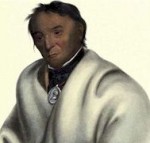
Pure tobacco
A Chippeway Warrior
Lac du Flambeau band
Metakoosega, or Pure tobacco, is one of the Lac du Flambeau band, of the Chippeway, or, more properly, Ojibway nation, and resides on the borders of Trout Lake. This man was one of a war party, raised in 1824, to go against the Sioux. They descended the Chippeway river to the Mississippi, and unfortunately fell in with a trader named Finley, from Prairie du Chien, whom, together with the crew of his boat, they murdered.
It is provided, by our treaties with the Indian tribes, that, upon the commission of such outrages, the offenders shall be given up by their tribes, to be tried and punished under our laws; and the practice of our government has been, to insist upon a rigid observance of this regulation. When the usual demand was made for the murderers of Finley, twenty-nine of the party voluntarily surrendered themselves to the agent at the Sault de St. Marie. They were examined, seven of them committed for trial, and confined at Mackinaw, and the remainder discharged. At the ensuing term of the court, the judge of the district declined trying the prisoners, in consequence of some objection which had been raised against his jurisdiction: and, during the following winter, they cut their way out of the log jail, and escaped.
In the mission of Governor Cass and Colonel McKenney to the Upper Lakes, in 1826, it was made part of their duty to ascertain and demand the real perpetrators of the aggression on the party of Mr. Finley. This has always been a difficult and delicate subject, in the relations of our government with the Indians, in consequence of the very wide difference between their moral code and our own. They admit the obligation of the lex talonis to its fullest extent, but they cannot understand that any other than the injured party has a right to claim the penalty. Had any of the near relatives of Mr. Finley, for instance, gone to the Lac du Flambeau, to revenge themselves upon his murderers, they would have been considered as in the praiseworthy performance of an act of duty, and would have been permitted to put the guilty parties to death, if they could and none would have interfered, either to aid or prevent them. But they view the interference of the government with jealousy; and while, on the one hand, they often refuse obstinately to betray the offender, or shield him by evasion and delay, they as often, on the other, when their fears of the resentment of our government become awakened, deliver up some innocent party, who volunteers his life as a peace offering, to satisfy what they deem a kind of national thirst for the blood of one of the tribe which has insulted us.
The following extract from Colonel McKenney’s account of this transaction will be interesting: “The council met; when, ac cording to arrangement, I made the demand for the surrender of the murderers. This being done, and there being one Indian present belonging to the Lac du Flambeau band, and who was of the party who committed the murder, he was called up, and formally examined. He is clearly innocent. Indeed his presence here demonstrates that fact. It was in proof, that .he dissuaded the murderers from committing the act. We told him, if he had been guilty, we would have taken him with us, and tried him by our laws; and if, on proof, he had turned out to have had a hand in the bloody act, he should have been hanged. During the examination, his brother came up to the table, greatly agitated. He showed great anxiety, and said he knew the murderers had upbraided his brother because he would riot join them. Another Indian declared he knew he was innocent. The governor said, ‘Will you put your hand on your breast, and say that in the presence of the Great Spirit?’ The moment the interpreter put this question, the Indian looked him full in the face, and answered, ‘Am I a dog, that I should lie?’ This reply is somewhat remarkable, not only on account of its resemblance to the scriptural expression ‘ Is thy servant a dog?’ &c. but because there is hardly any thing on which an Indian sets so high a value as his dog. This is proverbial; yet he is constantly referred to as an object of contempt! Indians never swear I mean until they learn it of their white brothers and their most degrading epithet is to call their opponents dogs. Here is a strange union of respect and contempt.”
Metakoosega was implicated in the murder, but did not surrender himself. He is a tall, well-made man, with a stern countenance; and is a jossekeed, or medicine worker, much respected by his band for his supposed skill in necromancy.
